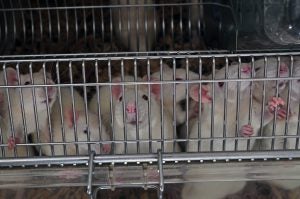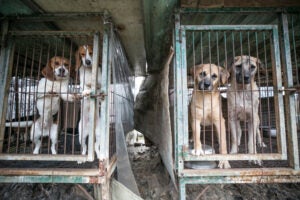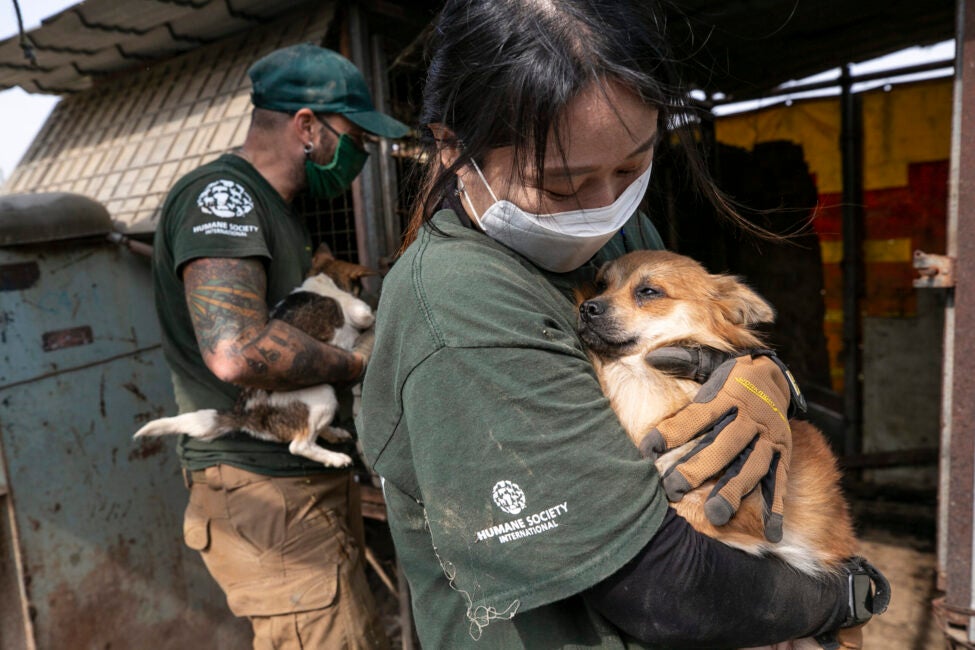
SEOUL—Twenty-one dogs left behind when authorities closed an illegal dog meat farm in Gyeonggi-do, South Korea, have been saved by animal groups just days before the start of Bok Nal—the three hottest days of summer during which most dogs on farms are sold and killed for dog meat soup, known as “bosintang.”
Humane Society International/Korea and Korean K9 Rescue saved the young dogs after Ansan city authorities shut down the facility for operating without a licence. The government officials removed 38 dogs to their shelter for rehoming but left 21 behind with a deadline for removal or they would be at risk of being euthanised or sold to a slaughterhouse. The farmer had been breeding dogs for human consumption at the site for six years.
The dogs—Romeo, Henry, Tori, Juliette, Brown Bear, Christian and all the others—will now receive veterinary care, vaccinations and undergo quarantine, before eventually being flown by HSI to North America to seek adoptive homes.
The rescue comes just days before South Korea’s first of three “Bok” days when dog meat consumption is most popular and the country’s usually low consumer demand increases. It is also the first Bok Nal since President Yoon Seok-yeol took office and comes as the government’s task force deliberating a nationwide dog meat ban has, for the second time, delayed announcing its recommendations for a phase out. President Yoon and first lady Kim Keon-hee—both of whom have voiced support for an end to dog meat—share their home with four dogs including Tori a rescued Jindo, a breed typically found on dog meat farms. The 21 dogs left on this illegal farm are Jindo crosses.
Sangkyung Lee, HSI/Korea’s dog meat campaign manager, said: “This dog farm is typical of so many across South Korea where thousands of dogs are languishing in filthy, deprived conditions, enduring the unimaginable frustration of being confined in tiny cages their whole lives until they are brutally killed by electrocution. Thankfully, we are able to bring a happy ending for these young dogs who will receive all the medical care and attention they need before flying to North America later in the year to seek adoptive homes. We urge President Yoon to ensure the national government immediately takes action to end the dog meat industry, so that no more dogs like these will have to endure this suffering for a food that most people in South Korea no longer wish to eat.”
The farmer, Mr Hwang, has signed a legally binding agreement never to farm dogs again. He said: “I make most of my money from doing handyman jobs, so that’s what I’ll continue to do now. When I took over the farm, the seller deceived me and my partner by telling us it would be a profitable business but it simply hasn’t been true.”
Gina Boehler, executive director of Korean K9 Rescue, said: “Korean K9 Rescue is happy to work in partnership with HSI in dismantling, and rescuing animals from, the Ansan dog meat farm. As the animals are suffering in the sweltering summer heat, we have moved quickly to remove them from an unbearable situation that no living being should endure. It’s important we keep pushing for reform and change to the agriculture laws within South Korea and effectively promote change from within. We are grateful for our collaboration with HSI and we know these dogs will go on to live a better life. We have seen and recognized the approval of most South Korean citizens who actively oppose the dog meat trade and lobby for change, which keeps our mission strong and alive.”
HSI/Korea, which has permanently closed down 17 dog meat farms in the country and assisted local groups and law enforcement in rescuing dogs from other farms and markets, campaigns for legislation in South Korea to end the dog meat industry. A recent opinion poll commissioned by HSI/Korea and conducted by Nielsen shows nearly 84% of South Koreans say they don’t or won’t eat dog, and almost 60% support a legislative ban.
Dog meat facts:
- Although most people in South Korea don’t eat dog, the belief that dog meat soup will cool the body and build stamina during the hot summer, particularly during Bok Nal season, still holds with some, especially the older generation.
- Since 2015, HSI/Korea’s Models for Change program has seen the organisation permanently close 17 dog meat farms, rescuing more than 2,500 dogs who find adoptive homes in the United States, Canada and the United Kingdom, with a small number rehomed in South Korea. The program also helps dog farmers transition to new, more humane, animal-free and profitable livelihoods such as chili plant and parsley growing or water truck delivery.
- Dog meat is banned (with varying degrees of enforcement) in Hong Kong, Taiwan, the Philippines, India, Thailand and Singapore, as well as the cities of Shenzhen and Zhuhai in mainland China, Siem Reap province in Cambodia, and in 17 cities and regencies across Indonesia.
- Despite these growing bans, an estimated 30 million dogs a year are still killed for meat across Asia.
- This rescue was conducted under careful health and safety restrictions, and all the dogs will receive veterinary care including tests for the presence of the H3N2 virus (“canine influenza”) as well as receiving rabies, distemper, hepatitis, parvo virus, parainfluenza and Leptospira vaccines. The dogs will be quarantined and health certified prior to transport overseas, in accordance with international export and import requirements.
Download photos and video of the rescue.
ENDS
Media contacts:
- United Kingdom: Wendy Higgins: whiggins@hsi.org, +44 (0)7989 972 423
- South Korea: Sangkyung Lee: slee@hsi.org
Nielsen online research conducted August/September 2020. Total sample size 1,000 people across six major cities in South Korea (Busan, Daegu, Incheon, Gwangju, Daejeon, Ulsan) weighted and representative of South Korean adults (aged 18+).








